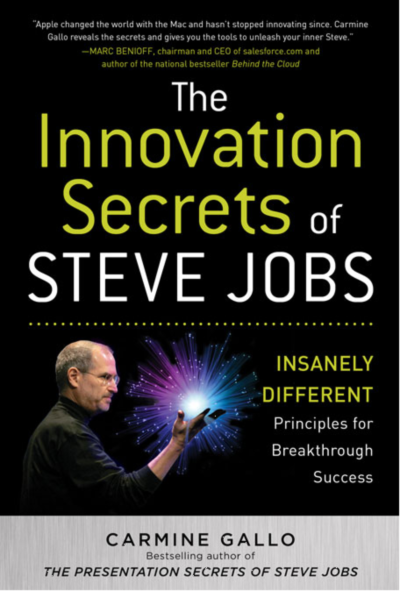The Innovation Secrets of Steve Jobs

In this post, we pay tribute to the iconic founder of Apple, Steve Jobs. His recent passing prompts many to reflect on his extraordinary influence on our technological universe. What can we learn from his remarkable success?
Although Jobs was an intensely private man, he “dropped many clues on his path to breakthrough success. All you have to do is look.” A book released earlier this year, The Innovation Secrets of Steve Jobs: Insanely Different Principles for Breakthrough Success, offers a glimpse with profound insights.
Author Carmine Gallo honestly and accurately describes his book as “not a biography of Steve Jobs. Instead, it seeks to uncover the principles that have led Steve Jobs to create boundless ideas that have truly changed the world – principles that you can apply today to unleash your potential. . . The principles are derived from a thorough examination of Jobs’ own words over the past three decades, insights from former Apple employees, experts who have covered the company for decades, and a wide range of business leaders, entrepreneurs, educators, and small business owners who have been inspired by asking themselves a simple question: What would Steve do?”
Gallo aptly organizes Innovation Secrets around Jobs’ seven core principles:
Principle 1: “Do What You Love” – Jobs followed his heart his entire life, and that, he says, has made all the difference.
Principle 2: “Put a Dent in the Universe” – Jobs attracted like-minded people who shared his vision and who helped turn his ideas into world-changing innovations.
Principle 3: “Kick-Start Your Brain” – Innovation does not exist without creativity, and for Jobs, creativity is the act of connecting things.
Tools and ideas to transform education. Sign up below.
Principle 4: “Sell Dreams, Not Products” – [People who buy Apple products] have dreams, hopes, and ambitions. Jobs built products to help them fulfill their dreams.
Principle 5: “Say No to 1,000 Things” – Simplicity is the ultimate sophistication. . . Innovation means eliminating the unnecessary so that the necessary may speak.
Principle 6: “Create Insanely Great Experiences” – Make deep, lasting emotional connections [between the innovation and customers].
Principle 7: “Master the Message” – You can have the most innovative idea in the world, but if you cannot get people excited about it, your innovation doesn’t matter.
The heart of Innovation Secrets is the interweaving of these principles with Jobs’ everyday life. The illustrative stories shared by Gallo are highly entertaining, informative, relevant, and timeless.
We were particularly impressed with how Jobs aggressively applied these principles to combat the status quo, freeing him from those inflicted with inside-the-(lock)box malaise and comatose proponents of conventional wisdom. These principles buoyed him in times of challenge and conflict to rise above ingrained mediocrity.
And who will ever forget Apple’s in-your-face “Think Different” ad campaign from 1997-2002? The officially released version was narrated by celebrity Richard Dreyfuss:
Here’s to the crazy ones, the misfits, the rebels, the troublemakers, the round pegs in the square holes . . . the ones who see things differently — they’re not fond of rules. . . You can quote them, disagree with them, glorify or vilify them, but the only thing you can’t do is ignore them because they change things . . . They push the human race forward, and while some may see them as the crazy ones, we see genius, because the ones who are crazy enough to think that they can change the world, are the ones who do.
Here’s an unaired copy of the irreverent Steve Jobs narrating: http://www.youtube.com/watch?v=8rwsuXHA7RA.
Innovation Secrets is a delightful, inexpensive journey into the mind of a genius. It’s an easy read with essential lessons for all:
Perhaps the ultimate lesson that Steve Jobs has taught us is that risk taking requires courage and a bit of craziness. See genius in your craziness. Believe in yourself and your vision, and be prepared to constantly defend those beliefs. Only then will innovation be allowed to flourish, and only then will you be able to lead an “insanely great” life.
Carmine Gallo
Dr. David Freitas has served in a number of leadership positions throughout his career including College Dean at three Universities, Tenured University Professor, University Vice Provost, Public School Teacher/Administrator, State of Illinois Teacher Certification Board Member, State Department of Education Official, and Elected City School Board Member. He is a frequent national and international presenter and author. Read more posts from David at Digital Learning Environments.
Janet Buckenmeyer, Ph.D., a former elementary school teacher, is currently a tenured Associate Professor and Chair of the Masters of Instructional Technology Program at Purdue University Calumet. She has published and presented nationally and internationally on various topics, with a primary focus on instructional technology and design.
Dr. Emily Hixon is an Assistant Professor of Educational Psychology and Instructional Technology at Purdue University Calumet. Her research projects have focused on the effective integration of technology at both the K-12 and higher education levels.
